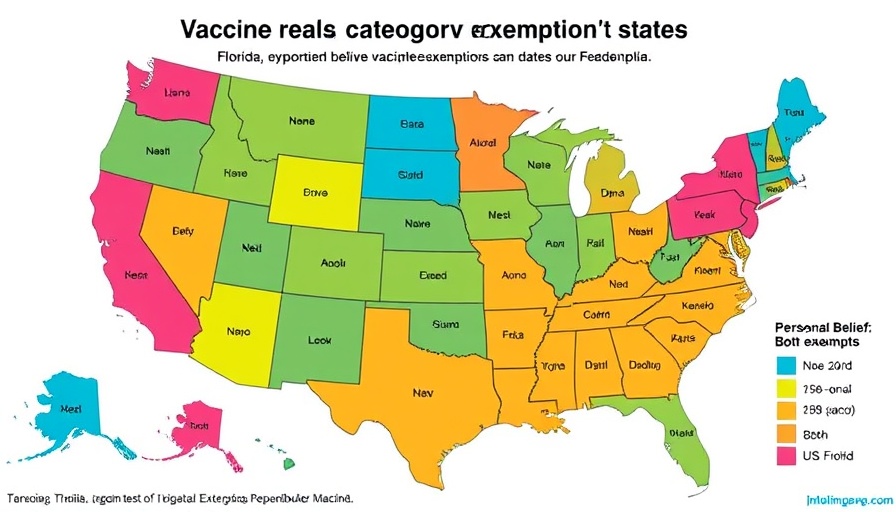
Why Understanding State Vaccine Requirements Matters
As parents continue to navigate the complexities of school enrollment, one aspect that stands out is the ever-changing landscape of state vaccine requirements for children. As of 2025, various states have amended, enacted, or reinforced regulations that dictate what vaccines are mandated before a child steps foot in the classroom. This not only fosters the immediate health of our children but plays a critical role in public health as a whole.
The Current State of Vaccine Mandates Across the Nation
Recent assessments reveal that states are on different paths regarding vaccination requirements. Some states have adopted stricter mandates while others have opted for more lenient approaches, reflecting a wide range of public sentiment and policy objectives. For instance, California has become a pioneer in vaccine mandates, often inspiring imitators as they work to improve student health outcomes. On the other hand, states like Texas uphold individual preferences, thus fostering a vibrant conversation about personal choice versus community responsibility.
Connecting The Dots: Public Health Implications
The rationale behind these mandates is deeply rooted in the protection of not only vaccinated children but also those who cannot be vaccinated due to health reasons. Vaccines protect against devastating preventable diseases such as measles, mumps, and rubella. With state policies in flux, parents should regularly check for updates to ensure their children meet vaccination requirements, securing their child’s seat in school and contributing to herd immunity.
Real Stories: Bridging the Gap Between Policy and Families
Take the story of Sarah, a mother from Virginia, who recently found herself navigating these policy changes. “I had to change my plans twice because my state updated its requirements. It’s not just about my children being vaccinated, it’s about ensuring they can attend school,” she says. Stories like Sarah’s reflect the real-life impact of these laws, forging a direct connection between policy and personal lives.
Pediatricians Weigh In: Importance of Communication
Healthcare professionals across the nation echo the sentiment that close collaboration between families and pediatricians is essential. Dr. Edwin Ramirez, a local pediatrician, emphasizes, “Families need to be informed. Knowledge about vaccine requirements helps parents feel empowered to make the best choices for their children.” Thus, health mandates should not only be enforced but communicated clearly. Understanding the nuances can help parents navigate the complexities of school enrollment.
What Are the Future Trends in Vaccine Legislation?
Looking ahead, it is likely that vaccine legislation will continue to experience fluctuations as public opinion evolves and new health challenges emerge. Continued advocacy from healthcare professionals, parents, and communities will play a critical role in determining the future landscape of vaccine mandates.
Steps Parents Can Take: How to Stay Informed
So, what can families do to stay proactive? Regularly visiting state health department websites, connecting with local school districts, and engaging with pediatricians can all ensure that families are equipped with the most up-to-date information. Additionally, local community forums can serve as platforms where parents share experiences and navigate changes together.
As the conversation about vaccine requirements continues to unfold, it’s essential for our community to remain vigilant, informed, and engaged. Understanding the implications of these changes is not just an individual concern—it impacts us all. Embrace this opportunity to educate yourself, your family, and your community, fostering a safer environment for every student.
To stay informed about ongoing developments in health policies impacting our children, consider discussing these changes with your local representatives or advocating for clearer communication from health authorities.
 Add Row
Add Row  Add
Add 




Write A Comment